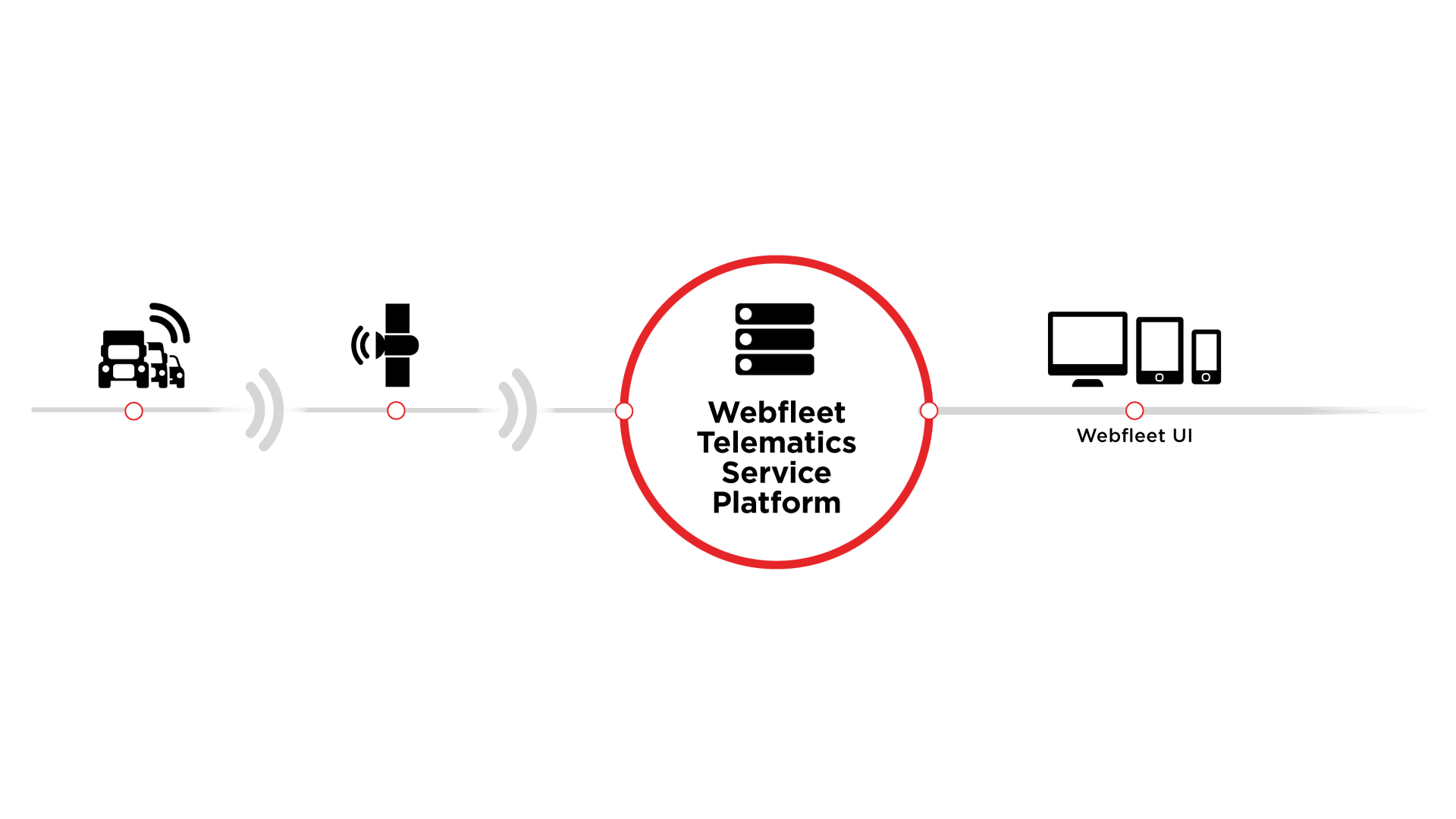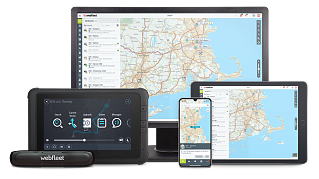







In this complete guide you can find information about:
What is telematics?
Telematics is a term that covers several key technologies. It includes the various telecommunication devices that support the sending, receiving and storing of data; the devices integrated within vehicles that support vehicle tracking and control while they’re on the move and satellite navigation and all of its applications.
Telematics in fleet management
The history of telematics spans decades, starting in the 1960s, when fleets logged vehicle use, maintenance schedules and driver information in dense paper files that were stored in metal cabinets. Computers, GPS and smartphones have all transformed fleet management. In this decade, Artificial Intelligence (AI) is starting to shape the future of mobility.
With evolving regulations and a rapidly changing industry, telematics has become key to fleet compliance, productivity and sustainability. Interested in exploring the history in more detail? See our blog post about the history of fleet digitisation.
How does a telematics system work?

Telematics heavily relies on the use of wireless data-transmitting technologies such as cellular and satellite networks. It is thanks to worldwide access to these networks that these systems are able to function in a very precise and reliable way.
Telematics systems log location data from the vehicle's GPS tracker, as well as diagnostic information collected in real time by the vehicle's many on-board electronics. This information is then shared via one of the aforementioned wireless networks and sent to Internet servers responsible for their treatment and formatting.
Finally, the vehicle’s real-time data is transferred to a monitoring device or application where it’s displayed in a clear, easily digestible fashion. In other words, the use of telematics enables fleets to collect and analyse their vehicle data.
What is the role of telematics in fleet management?
Telematics technology gives fleet managers full visibility of their operations. They can track vehicle locations, monitor driving behaviour and optimise routing and job planning—all in real time. Webfleet’s telematics solutions are designed to help fleets run more productively, efficiently, safely and sustainably.
What is a telematics device and how does it work?
A telematics device (also called a black box) is a small electronic device that is installed in a vehicle to collect and transmit the vehicle’s performance data. The device works by using various sensors and GPS technology to track factors like a vehicle's location, speed and fuel consumption. Fleet managers can leverage such data to optimise vehicle performance, improve driver safety and reduce operational costs.


What kind of data does a telematics device collect?
From vehicle locations to fuel consumption and driving behaviour, fleets generate a huge amount of potential data. With this data, fleet managers can assess driving behaviours like acceleration, speed and braking, all of which affect fuel consumption and vehicle condition.
Vehicle maintenance data is also collected, helping fleet managers resolve mechanical issues before they lead to costly repairs or downtime.
Telematics and sustainability
Since telematics involves data on fuel consumption and driving behaviours, it’s invaluable to fleet sustainability. Fleet managers can optimise their job routes based on patterns in vehicle and driving performance data. For example, the data may show that it’s possible to combine certain routes, reducing mileage and fuel use. Other advantages that a solution like Webfleet provides include the capabilities to:
- Track, measure and reduce fleet emissions
- Create accurate reports for TCFD and CSRD compliance
- Electrify a fleet in an efficient and cost-effective manner
- Extend the lifetime of tyres and existing fleet vehicles
- Manage a fleet of electric vehicles on a single platform


How do telematics devices and mobile apps work together?
Telematics is the combination of hardware and software that connects a vehicle to the internet and allows it to be monitored remotely. With apps, you can access the functionality of your fleet management software from your mobile phone. As with the desktop version of your fleet management system, you can easily monitor your vehicles, know your driver status and dispatch orders.
The Webfleet Mobile app, for instance, makes it possible for fleet managers to run their fleets from their mobile phones. The vehicle tracking and safe-driving data collected by our telematics devices are transmitted to your management account. All you need is an internet connection to access your real-time location and status data.
Webfleet provides apps for your drivers too: Work App simplifies daily task management and navigation; Logbook eliminates admin hassles with mileage tracking; Vehicle Check digitises daily vehicle inspections. Discover our full range of productivity apps for fleet managers and drivers.
Where do you place/install a telematics device?
Telematics devices are typically installed in a vehicle's onboard diagnostic (OBD-II) port, usually located under the dashboard on the driver's side of the vehicle. Some devices can be installed using an external power source and connected to the vehicle's wiring. Newer vehicles may come with built-in systems that are already integrated into the vehicle's electronics. Before installing a telematics device, it’s always good to consult with the device manufacturer or a professional installer on the best placement for your specific device.


What kind of industries use telematics for fleet management?
Telematics suits companies and organizations that use vehicles for their daily business. Delivery and maintenance services, construction and plumbing businesses, healthcare providers and passenger transport services: Fleets of all shapes and sizes rely on telematics to increase safety and operate more efficiently.
How can you use a telematics system benefit your fleet business?
Telematics systems can be used for various types of commercial vehicles. Fleets with cars, vans, trucks or buses use telematics to track their vehicles and other business assets. Construction companies also monitor the usage of their vehicles and equipment. But the benefits go beyond vehicle tracking alone, as noted here:
- Reduce costs
- Get real-time and historical insights that can help you stay on top of fuel consumption and preventative maintenance tasks, helping you save on these expenses.
- Boost productivity and safety
- Optimise routes with professional navigation, keeping your drivers on the quickest and safest routes while satisfying customers with accurate updates and on-time delivery.
- Manage compliance
- Count on reliable data and downloadable reports to simplify your compliance with drivers’ hours rules and increasingly strict environmental regulations and low-emissions zones.
- Improve communication
- Send order instructions from your office directly to your driver's PRO Driver Terminal, which will read the message out loud to the driver, minimising distractions so your drivers can focus on the road.
- Provide driver coaching
- Analyse driving performance benchmarks to determine whether certain drivers could benefit from coaching on safer and/or more fuel-efficient driving.
- Reduce insurance premiums
- Like most fleet managers, you’re probably eager to save on insurance. Did you know that telematics can help you lower your insurance costs? Some insurance companies use safety data to determine the premium. By sharing data with your insurance provider, you may be able to cut your overall insurance costs.
You could qualify for a lower rate, for example, if your data shows improvements in driver safety. Does your fleet use driver-identification tools? Then you could also qualify for a lower rate, since driver identification is key to driver safety while preventing vehicle theft.
What does the future of telematics look like?
The future of telematics is expected to bring significant advancements, such as the use of AI to improve data analysis and decision-making. Additionally, the rapid adoption of electric vehicles (EVs) is increasing the demand for systems to monitor and optimise their performance. Telematics solutions play an important role in helping shape EV strategies, with insights that help fleets make the right decisions at the right times, both for EV procurement and ongoing management.
How can Webfleet help you with a telematics solution?
A high-quality telematics solution like Webfleet gives you access to and control over your vehicle data, plus the tools and features your business needs to benefit from it. From planning your daily schedule to communicating with your team on the road, it can optimize every step of your vehicle management.
Wondering what your fleet business can achieve with Webfleet?
Book a consultation with one of our fleet experts, so we can show you how to save time and money.






Your consent is required
In this section, external content is being embedded from.
To display the content, your consent is required for the following cookie categories:
- Targeted Advertising
- Analytics & Personalization
- Essential
For further details, please refer to our privacy policy.If you are interested in how ###vendor_name### processes your data, please visit their privacy policy.








